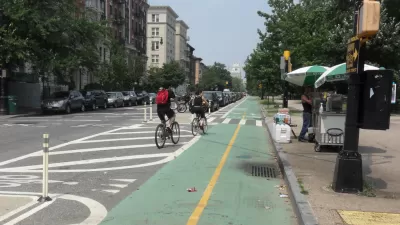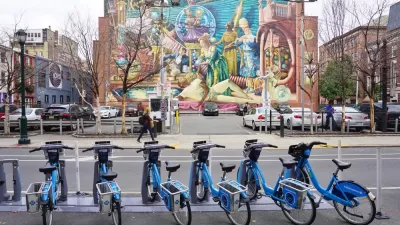For cities that want protected bike lanes but lack the expertise to implement them, the Green Lane Project is soliciting applications to offer technical help (sorry, no funding) now that the initial six recipient cities have implemented cycle tracks.
As we described here last August, "protected bike lanes, also referred to as 'cycle tracks' - are a special class of premium bike infrastructure where the bike lane is separated from car traffic by several possible means. It could be a row of parked cars or plastic bollards; sometimes it's just striped paint" (about a foot-wide as opposed to a single, striped line, in which case it may be called a 'buffered bike lane').
Angie Schmitt writes that the Green Lane Project initiative comes by way of "PeopleForBikes, the bike industry-supported advocacy organization."
In the first round, six cities — Washington, Portland, Austin, Memphis, Chicago, and San Francisco — were selected to help advance their next-generation bike infrastructure.
While 39 cities have been invited to apply for round two, any city with a population 80,000 is eligible.
The last round saw 42 applications from places as varied as Wichita and Pittsburgh. A new round of six cities will be selected for assistance in 2014 and 2015.
How popular are protected bike lanes among bike riders?
A recent poll of New York City cyclists circulated by Transportation Alternatives found overwhelming support for protected bike lanes over preferences for conventional bike lanes, sharrows, or street-riding with no lanes. Michael Anderson of the Green Lane Project writes on Oct. 17 that "a whopping 84 percent said protected lanes were the best".
While Green Lane "does not provide funding for infrastructure, [they] offer small grants (likely $20K to $25K) to the focus cities to aid in the implementation of protected bike lanes", according to the FAQ.
Interested? Applications are now being accepted from governmental agencies only. Submit a letter of intent to apply by November 15, 2013. Applications are due by January 14, 2014. Winners will be announced in March, 2014. Here's what Green Lane Project director Martha Roskowski is looking for:
The winning cities will have a mix of political will, committed staff, and community support to implement ambitious plans for protected bike lanes during the two-year campaign period.
More questions? Answers may be here.
FULL STORY: Green Lane Project Looking for Six New Cities With Big Bike Ambitions

Alabama: Trump Terminates Settlements for Black Communities Harmed By Raw Sewage
Trump deemed the landmark civil rights agreement “illegal DEI and environmental justice policy.”

Study: Maui’s Plan to Convert Vacation Rentals to Long-Term Housing Could Cause Nearly $1 Billion Economic Loss
The plan would reduce visitor accommodation by 25% resulting in 1,900 jobs lost.

Planetizen Federal Action Tracker
A weekly monitor of how Trump’s orders and actions are impacting planners and planning in America.

Wind Energy on the Rise Despite Federal Policy Reversal
The Trump administration is revoking federal support for renewable energy, but demand for new projects continues unabated.

Passengers Flock to Caltrain After Electrification
The new electric trains are running faster and more reliably, leading to strong ridership growth on the Bay Area rail system.

Texas Churches Rally Behind ‘Yes in God’s Back Yard’ Legislation
Religious leaders want the state to reduce zoning regulations to streamline leasing church-owned land to housing developers.
Urban Design for Planners 1: Software Tools
This six-course series explores essential urban design concepts using open source software and equips planners with the tools they need to participate fully in the urban design process.
Planning for Universal Design
Learn the tools for implementing Universal Design in planning regulations.
Caltrans
Smith Gee Studio
Institute for Housing and Urban Development Studies (IHS)
City of Grandview
Harvard GSD Executive Education
Toledo-Lucas County Plan Commissions
Salt Lake City
NYU Wagner Graduate School of Public Service




























